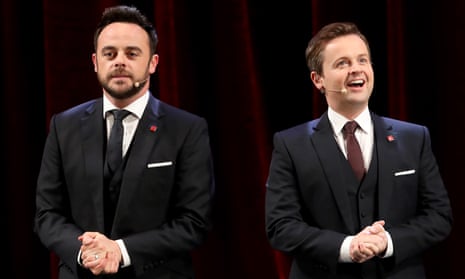The weekend brought the news that Ant McPartlin, one half of Ant and Dec – PJ of PJ and Duncan fame – has checked into rehab for addiction problems with alcohol and drugs. He’s to spend a couple of months in recovery, where – hopefully – he’ll come out armed with the knowledge of how he became unwell in the first place, and how he can keep himself safe and sober in the long term.
He has got the initial major obstacle tackled, as he freely admitted: “The first step is to admit to yourself you need help.” However, what was most disheartening from the news stories that came out were the lines that followed: “I feel like I have let a lot of people down and for that I am truly sorry.”
As someone who has spent time in rehab for drink problems, I can tell you that it’s absolutely key to tackle this element of shame that is currently in his mind. Let me be clear: no more than someone suffering from cancer has he let anyone down. Not friends, family, colleagues, fans, or himself. He’s unwell, pure and simple, and he needs to go somewhere where he can get well – safely – and where he can learn the techniques he needs to remain safe and sober in the future.
When I first went into rehab, after nearly a decade of alcohol abuse, the first thing I was told in my first therapy session (of which McPartlin will have plenty), was: “You’re not a bad person trying to be good, you’re an ill person trying to get, and remain, well.” I can’t overstate how important this was.
Addiction is often intertwined with mental health issues which stem heavily from self-esteem, so to be told you’re neither an idiot nor a terrible person, just an unwell one was an enormous weight to lift off my shoulders. It’s not anyone’s “fault” that addiction takes hold, but it’s way too often seen as self-inflicted, selfish, and wantonly self-destructive when this is far from the truth.
While I was still drinking I suffered from depression, anxiety and stress – all of which I tried to medicate through drinking every night until I fell asleep. Sadly, all this does is set you up for a day of panic, stress and anxiety the day after. Addiction is frequently cyclical, and we’ve seen from the developments with McPartlin that this seems to have happened here too – painkillers turned into dependency and drink started to play a part in numbing senses and pain. Such a process though isn’t his fault, and so he mustn’t think he’s let anyone down in developing an addiction.

His very public announcement of his issues is highly commendable. There are regularly people who are prominent in the public eye going into rehab, but with McPartlin it seems different – he’s not an ageing rocker, nor a reality-TV show celebrity whose star is in the wane. He’s one of the most recognisable smiling faces of Saturday schedules – people my age grew up with him and Dec from their Byker Grove days, and the pair have become family favourites. As such, the awareness he’ll raise through going public can, you’d hope, only encourage others suffering to seek help. Knowing it’s not just you that is going through this is hugely important; knowing there are others who feel your pain and have the same trouble coping with life sometimes.
But he should not be apologising to anyone, nor saying he’s let them down. If we continue to treat addiction as something self-inflicted then other people still suffering might not ask for help – they’ll just keep hiding, with the shame that keeps them drinking, taking drugs, gambling, or whatever their vice might be, still firmly in control of them.
Relinquishing this control is not a simple, straightforward affair – as rehab will show McPartlin. I’ve been sober seven and a half years now, but I still have to be as careful as the first day I came out from rehab, I can’t let my guard slip. I also need to keep an eye on when the mental health problems and the shame might be creeping back – and then use the techniques I learned in rehab to stop them spiralling.
I still wonder, however, whether I’d have asked for help sooner if I knew it was OK to be unwell, and being an addict didn’t make me a bad person. Hopefully McPartlin can address similar demons too, but the public, media and those around him need to help remove the blame and shame mentality, and enable more people to seek help sooner.
